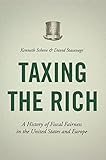Taxing the rich : a history of fiscal fairness in the United States and Europe / Kenneth Scheve and David Stasavage.
Material type: TextLanguage: English Publication details: New York : Russell Sage Foundation, 2016.Description: xv, 266 p. ; 24 cmISBN:
TextLanguage: English Publication details: New York : Russell Sage Foundation, 2016.Description: xv, 266 p. ; 24 cmISBN: - 9780691165455
- 0691165459
- History of fiscal fairness in the United States and Europe
- Riqueza -- Impuestos -- Estados Unidos -- Historia
- Riqueza -- Impuestos -- Europa -- Historia
- Impuesto sobre la renta de las personas físicas -- Estados Unidos -- Historia
- Impuesto sobre la renta de las personas físicas -- Europa -- Historia
- Impuestos sobre la renta -- Estados Unidos -- Historia
- Impuestos progresivos -- Estados Unidos -- Historia
- Riqueza -- Estados Unidos -- Historia
- Impuestos sobre la renta -- Europa
- Impuestos progresivos -- Europa
- Riqueza -- Europa -- Historia
- 336.226
- HJ 4653 S328t 2016
| Item type | Current library | Home library | Collection | Shelving location | Call number | Copy number | Status | Date due | Barcode |
|---|---|---|---|---|---|---|---|---|---|
 Libro
Libro
|
Biblioteca Juan Bosch | Biblioteca Juan Bosch | Ciencias Sociales | Ciencias Sociales (3er. Piso) | HJ 4653 S328t 2016 (Browse shelf(Opens below)) | 1 | Available | 00000163358 |
Includes bibliographical references (pages 220-259) and index.
Debating Taxation. Why might governments tax the rich? --
Treating citizens as equals --
When Have Governments Taxed the Rich?. The income tax over two centuries --
Taxing inheritance --
Taxes on the rich in context --
Why Have Governments Taxed the Rich?. The conscription of wealth --
The role of war technology --
Why taxes on the rich declined --
What future for taxing the rich?
Taxing the Rich draws on unparalleled evidence from twenty countries over the last two centuries to provide the broadest and most in-depth history of progressive taxation available. Scheve and Stasavage explore the intellectual and political debates surrounding the taxation of the wealthy while also providing the most detailed examination to date of when taxes have been levied against the rich and when they haven't. Fairness in debates about taxing the rich has depended on different views of what it means to treat people as equals and whether taxing the rich advances or undermines this norm. Scheve and Stasavage argue that governments don't tax the rich just because inequality is high or rising--they do it when people believe that such taxes compensate for the state unfairly privileging the wealthy. Progressive taxation saw its heyday in the twentieth century, when compensatory arguments for taxing the rich focused on unequal sacrifice in mass warfare. Today, as technology gives rise to wars of more limited mobilization, such arguments are no longer persuasive. Taxing the Rich shows how the future of tax reform will depend on whether political and economic conditions allow for new compensatory arguments to be made


There are no comments on this title.